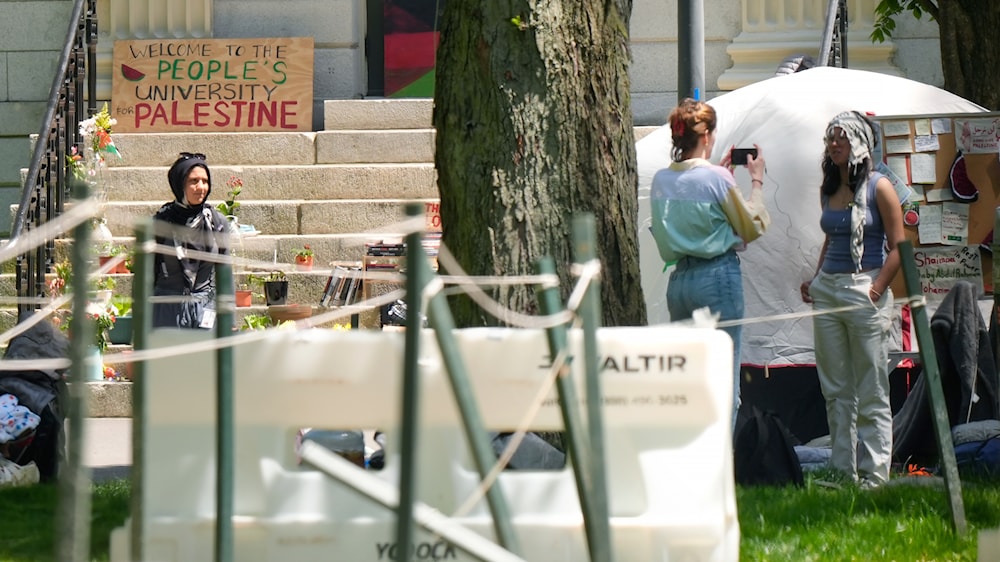Harvard agrees to discuss divestment from 'Israel' following protests
The student protest group Harvard Out of Occupied Palestine says that a pre-condition of the decamping is that the administration will take back suspensions.
-

Students near the remnants of an encampment of tents in Harvard Yard, on the campus of Harvard University, Tuesday, May 14, 2024, in Cambridge, Massachusetts. (AP)
After Harvard agreed to discuss student concerns on the university's endowment concerning "Israel", protesters against the Israeli war on Gaza took down their tents in the university yard on May 14.
Harvard oversees the biggest academic endowment in the world, amounting to around $50 billion, and invests part of it in funds and companies, some of which are linked to "Israel".
In a statement on Instagram, the student protest group Harvard Out of Occupied Palestine (HOOP coalition) said that after surviving beyond the student move-out, the encampment has come to an end, however, "the struggle for Palestinian liberation goes on."
View this post on Instagram
They added that they built the "Liberated Zone in Harvard Yard as a model of the world we want to see: one that proudly affirms Palestinian liberation rather than elimination."
The students highlighted how every day they sustained their encampment, their organizing capacity was strengthened, adding that they forced the "question of Palestine on an institution that has historically refused it."
HOOP: Harvard turned Yard into 'surveillance state'
HOOP went on to describe how Harvard attempted to quietly "choke" them out from closing its gates to the public, to even turning Harvard Yard into a "surveillance state."
According to the students, a pre-condition of the decamping is that the administration would take back student suspensions, adding that it has also offered them meetings regarding disclosure and divestment with members of the Harvard Management Company, alongside talks about the launch of a Center for Palestine Studies at Harvard.
HOOP emphasized that they are "under no illusions," as they know that these meetings are not divestment wins but are rather attempts to "pacify" them from full disclosure and divestment, however, that will not work.
They ended their statement by saying "Harvard beware: the Liberated Zone is everywhere."
Harvard University Interim President Alan Garber agreed to meet with the students and answer their questions.
Protests in support of Gaza are ongoing
The director of Al Mayadeen's office in Geneva reported that student protests at Swiss universities are still taking place in support of Gaza and condemnation of Israeli crimes.
In addition, Herald Square in New York City has witnessed a massive demonstration in support of Palestine.
Demonstration in support of Palestine in Herald Square, Manhattan, New York. pic.twitter.com/StStPaBdwT
— War Watch (@WarWatchs) May 14, 2024
Harvard Law student gov. urged university to divest from 'Israel'
The Harvard Law School (HLS) Student Government passed a resolution on March 29 urging the university to completely divest from any organization that supports the Israeli war on Gaza.
The measure urged the Harvard Management Company (HMC), which manages the school's $50 billion endowment, "to divest completely from weapons manufacturers, firms, academic programs, corporations, and all other institutions that aid the ongoing occupation of Palestine and the genocide of Palestinians."
The HLS Student Government alludes to Harvard's commitment of nearly $200 million in businesses linked to the Israeli occupation military and illegal settlements in Palestine, similar to HMC's prior divestment from South African apartheid and the tobacco industry in 1990.
The resolution's author, Swap Agrawal, expressed that some Palestinian students at the school have "lost dozens of family members in the ongoing genocide," noting that students reported feeling strongly that it was "necessary to put pressure on things to change."
He added that students are deeply concerned that money held in trust may be funding this genocide, emphasizing that the resolution was affected by the International Court of Justice's statement in January, which found it "plausible" that "Israel" had violated the Genocide Convention.
After the resolution vote, which had 12 supporters, four opponents, and three abstentions, two board members resigned, stating that they did so because they "strongly disagree" with it.

 4 Min Read
4 Min Read








